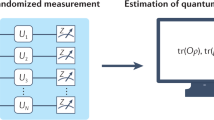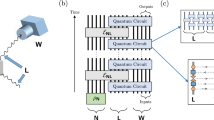Abstract
Quantum computation and cryptography both involve scenarios in which a user interacts with an imperfectly modelled or ‘untrusted’ system. It is therefore of fundamental and practical interest to devise tests that reveal whether the system is behaving as instructed. In 1969, Clauser, Horne, Shimony and Holt proposed an experimental test that can be passed by a quantum-mechanical system but not by a system restricted to classical physics. Here we extend this test to enable the characterization of a large quantum system. We describe a scheme that can be used to determine the initial state and to classically command the system to evolve according to desired dynamics. The bipartite system is treated as two black boxes, with no assumptions about their inner workings except that they obey quantum physics. The scheme works even if the system is explicitly designed to undermine it; any misbehaviour is detected. Among its applications, our scheme makes it possible to test whether a claimed quantum computer is truly quantum. It also advances towards a goal of quantum cryptography: namely, the use of ‘untrusted’ devices to establish a shared random key, with security based on the validity of quantum physics.
This is a preview of subscription content, access via your institution
Access options
Subscribe to this journal
Receive 51 print issues and online access
$199.00 per year
only $3.90 per issue
Buy this article
- Purchase on Springer Link
- Instant access to full article PDF
Prices may be subject to local taxes which are calculated during checkout


Similar content being viewed by others
References
Aharonov, D., Ben-Or, M. & Eban, E. in Proc. Innovations in Computer Science (ICS) (ed. Yao, A.) 453–469 (Tsinghua Univ. Press, 2010)
Broadbent, A., Fitzsimons, J. F. & Kashefi, E. in Proc. IEEE Foundations of Computer Science (FOCS) 517–526 (IEEE Computer Society, 2009)
Bennett, C. H. & Brassard, G. in Proc. IEEE Int. Conf. on Computers, Systems and Signal Processing 175–179 (IEEE Computer Society, 1984)
Lo, H.-K. & Chau, H. F. Unconditional security of quantum key distribution over arbitrarily long distances. Science 283, 2050–2056 (1999)
Shor, P. W. & Preskill, J. Simple proof of security of the BB84 quantum key distribution protocol. Phys. Rev. Lett. 85, 441–444 (2000)
Zhao, Y., Fung, C.-H. F., Qi, B., Chen, C. & Lo, H.-K. Quantum hacking: experimental demonstration of time-shift attack against practical quantum key distribution systems. Phys. Rev. A 78, 042333 (2008)
Lydersen, L. et al. Hacking commercial quantum cryptography systems by tailored bright illumination. Nature Photon. 4, 686–689 (2010)
Gerhardt, I. et al. Full-field implementation of a perfect eavesdropper on a quantum cryptography system. Nature Commun. 2, 349 (2011)
Mayers, D. & Yao, A. in Proc. IEEE Foundations of Computer Science (FOCS) 503–509 (IEEE Computer Society, 1998)
Ekert, A. K. Quantum cryptography based on Bell’s theorem. Phys. Rev. Lett. 67, 661–663 (1991)
Barrett, J., Hardy, L. & Kent, A. No signalling and quantum key distribution. Phys. Rev. Lett. 95, 010503 (2005)
Masanes, L., Renner, R., Christandl, M., Winter, A. & Barrett, J. Unconditional security of key distribution from causality constraints. Preprint at http://arXiv.org/abs/quant-ph/0606049 (2006)
Acín, A., Massar, S. & Pironio, S. Efficient quantum key distribution secure against no-signalling eavesdroppers. N. J. Phys. 8, 126 (2006)
Masanes, L. Universally composable privacy amplification from causality constraints. Phys. Rev. Lett. 102, 140501 (2009)
Hänggi, E., Renner, R. & Wolf, S. in Proc. EUROCRYPT (ed. Gilbert, H.) 216–234 (LNCS 6110, Springer, 2010)
Acín, A. et al. Device-independent security of quantum cryptography against collective attacks. Phys. Rev. Lett. 98, 230501 (2007)
Pironio, S. et al. Device-independent quantum key distribution secure against collective attacks. N. J. Phys. 11, 045021 (2009)
McKague, M. Device independent quantum key distribution secure against coherent attacks with memoryless measurement devices. N. J. Phys. 11, 103037 (2009)
Hänggi, E. & Renner, R. Device-independent quantum key distribution with commuting measurements. Preprint at http://arXiv.org/abs/1009.1833 (2010)
Masanes, L., Pironio, S. & Acín, A. Secure device-independent quantum key distribution with causally independent measurement devices. Nature Commun. 2, 238 (2011)
Holevo, A. S. Bounds for the quantity of information transmitted by a quantum communication channel. Probl. Inf. Transm. 9, 177–183 (1973)
Bell, J. S. On the Einstein-Podolsky-Rosen paradox. Physics 1, 195–200 (1964)
Clauser, J. F., Horne, M. A., Shimony, A. & Holt, R. A. Proposed experiment to test local hidden-variable theories. Phys. Rev. Lett. 23, 880–884 (1969)
Cirel’son, B. S. Quantum generalizations of Bell’s inequality. Lett. Math. Phys. 4, 93–100 (1980)
Braunstein, S. L., Mann, A. & Revzen, M. Maximal violation of Bell inequalities for mixed states. Phys. Rev. Lett. 68, 3259–3261 (1992)
Popescu, S. & Rohrlich, D. Which states violate Bell’s inequality maximally? Phys. Lett. A 169, 411–414 (1992)
Magniez, F., Mayers, D., Mosca, M. & Ollivier, H. in Proc. Int. Coll. on Automata, Languages and Programming (ICALP) (eds Bugliesi, M. et al.) 72–83 (LNCS 4051, Springer, 2006)
McKague, M., Yang, T. H. & Scarani, V. Robust self-testing of the singlet. J. Phys. A 45, 455304 (2012)
Miller, C. & Shi, Y. Robust self-testing quantum states and binary nonlocal XOR games. Preprint at http://arXiv.org/abs/1207.1819 (2012)
Gottesman, D. & Chuang, I. L. Demonstrating the viability of universal quantum computation using teleportation and single-qubit operations. Nature 402, 390–393 (1999)
Watrous, J. PSPACE has constant-round quantum interactive proof systems. Theor. Comput. Sci. 292, 575–588 (2003)
Fitzsimons, J. F. & Kashefi, E. Unconditionally verifiable blind computation. Preprint at http://arXiv.org/abs/1203.5217 (2012)
Barz, S. et al. Demonstration of blind quantum computing. Science 335, 303–308 (2012)
Broadbent, A., Fitzsimons, J. F. & Kashefi, E. QMIP = MIP*. Preprint at http://arXiv.org/abs/1004.1130 (2010)
Jordan, C. Essai sur la géométrie à n dimensions. Bull. Soc. Math. Fr. 3, 103–174 (1875)
Reichardt, B. W., Unger, F. & Vazirani, U. A classical leash for a quantum system: command of quantum systems via rigidity of CHSH games. Preprint at http://arXiv.org/abs/1209.0448 (2012)
Mossel, E., O'Donnell, R. & Oleszkiewicz, K. Noise stability of functions with low influences: invariance and optimality. Ann. Math. 171, 295–341 (2010)
McKague, M. Quantum Information Processing with Adversarial Devices. PhD thesis, Univ. Waterloo. (2010)
Gottesman, D. Stabilizer Codes and Quantum Error Correction. PhD thesis, California Inst. Technol. (1997)
Kempe, J., Kobayashi, H., Matsumoto, K. & Vidick, T. Using entanglement in quantum multi-prover interactive proofs. Comput. Complex. 18, 273–307 (2009)
Acknowledgements
We thank E. Bering, A. Broadbent, A. Chailloux, M. Christandl, R. Colbeck, T. Ito, R. König, M. McKague, V. Madhavan, R. Renner, S. Sondhi and T. Vidick for discussions. Part of this work was conducted while F.U. was at the University of California Berkeley and B.W.R. was at the Institute for Quantum Computing, University of Waterloo. B.W.R. acknowledges support from NSERC, ARO-DTO and Mitacs. U.V. acknowledges support from US NSF grant CCF-0905626 and Templeton grant 21674
Author information
Authors and Affiliations
Contributions
All authors made significant contributions to the research presented in this paper.
Corresponding author
Ethics declarations
Competing interests
The authors declare no competing financial interests.
Supplementary information
Supplementary Information
This file contains Supplementary Text and Data, Supplementary Figure 1 and Supplementary References. (PDF 378 kb)
PowerPoint slides
Rights and permissions
About this article
Cite this article
Reichardt, B., Unger, F. & Vazirani, U. Classical command of quantum systems. Nature 496, 456–460 (2013). https://doi.org/10.1038/nature12035
Received:
Accepted:
Published:
Issue Date:
DOI: https://doi.org/10.1038/nature12035
This article is cited by
-
Robust and efficient verification of graph states in blind measurement-based quantum computation
npj Quantum Information (2023)
-
Quantum networks self-test all entangled states
Nature Physics (2023)
-
Quantum NETwork: from theory to practice
Science China Information Sciences (2023)
-
Analysis of boolean functions related to binary input binary output two-party nonlocal games
Cryptography and Communications (2023)
-
3XOR Games with Perfect Commuting Operator Strategies Have Perfect Tensor Product Strategies and are Decidable in Polynomial Time
Communications in Mathematical Physics (2023)
Comments
By submitting a comment you agree to abide by our Terms and Community Guidelines. If you find something abusive or that does not comply with our terms or guidelines please flag it as inappropriate.



